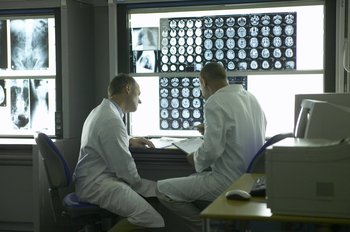National Jewish Health conducts extensive research across various respiratory and immune-related conditions. Our asthma research focuses on understanding disease mechanisms, innovative treatments and patient-centered approaches. In chronic obstructive pulmonary disease (COPD), we lead large genetic studies and clinical trials to improve patient outcomes. Our interstitial lung disease programs explore mechanisms of diseases like idiopathic pulmonary fibrosis and involve collaborative research for novel therapies. Allergic disease research encompasses a wide range of allergies, including food and eczema, aiming for personalized treatment strategies. Cystic fibrosis and pulmonary hypertension research focus on advancing treatment options through clinical trials. Additionally, we study sleep disorders, environmental lung diseases, and cancer, particularly lung cancer, utilizing advanced imaging and immunotherapy. Ultimately, our research aims to enhance understanding, diagnosis and management across these complex health issues.
 National Jewish Health is at the forefront of asthma research, investigating the fundamental mechanisms that drive the disease. Our research aims to identify new therapeutic targets and biomarkers that can help predict disease progression and personalize treatment. By focusing on both the immune system’s role in asthma and the environmental triggers that exacerbate symptoms, our researchers are developing more precise, individualized treatment strategies to improve asthma control and enhance the quality of life for patients. We emphasize patient-centered care, integrating the latest findings into clinical practice to ensure treatments are tailored to each patient’s unique asthma profile. Here is an overview of our research efforts in this area:
National Jewish Health is at the forefront of asthma research, investigating the fundamental mechanisms that drive the disease. Our research aims to identify new therapeutic targets and biomarkers that can help predict disease progression and personalize treatment. By focusing on both the immune system’s role in asthma and the environmental triggers that exacerbate symptoms, our researchers are developing more precise, individualized treatment strategies to improve asthma control and enhance the quality of life for patients. We emphasize patient-centered care, integrating the latest findings into clinical practice to ensure treatments are tailored to each patient’s unique asthma profile. Here is an overview of our research efforts in this area:
- Cohen Asthma Institute: Our institute focuses on comprehensive asthma care, integrating both clinical and research components. We work to understand the underlying mechanisms of asthma, develop new treatments and improve patient outcomes.
- Research Programs: Our cutting-edge research in asthma explores the genetic, environmental and immunological factors that contribute to the disease. We conduct clinical trials and research studies aimed at better understanding disease mechanisms and testing new therapies.
- Collaborative Studies: We frequently collaborate with other institutions and researchers to expand the scope and impact of our asthma research. This includes national and international studies aimed at improving asthma management and treatment.
- Murnick Asthma Discovery Accelerator Program
- Innovative Therapies: Research at National Jewish Health involves the development of novel therapies and treatments, ranging from new medications to advanced biologic therapies targeting specific pathways involved in asthma.
- Patient-Centered Research: We focus on research that directly impacts patient care throughout the lifespan, such as developing improved diagnostic tools, refining methods for monitoring asthma and enhancing personalized treatment approaches.
- Asthma Research Advancements: Novel antimicrobial treatment for nocturnal asthma.
Discovery of IgE, major protein involved in allergic reactions and eosinophilic asthma.
 COPD research at National Jewish Health is groundbreaking, particularly in the areas of genetics, environmental exposures and clinical trials. Through large-scale genetic studies, we are uncovering the genetic underpinnings of COPD, which could lead to targeted therapies addressing the root causes of the disease. In addition, the institution leads numerous clinical trials aimed at improving COPD management by exploring both pharmacologic and non-pharmacologic interventions. We aim to reduce the burden of this chronic, progressive disease and improve outcomes for patients, particularly those with severe forms of COPD. Here is a look at some of our COPD research efforts:
COPD research at National Jewish Health is groundbreaking, particularly in the areas of genetics, environmental exposures and clinical trials. Through large-scale genetic studies, we are uncovering the genetic underpinnings of COPD, which could lead to targeted therapies addressing the root causes of the disease. In addition, the institution leads numerous clinical trials aimed at improving COPD management by exploring both pharmacologic and non-pharmacologic interventions. We aim to reduce the burden of this chronic, progressive disease and improve outcomes for patients, particularly those with severe forms of COPD. Here is a look at some of our COPD research efforts:
- COPDGene Center: We lead the largest NIH-sponsored program examining genetic and clinical changes in the largest COPD patient cohort in the United States. Our COPD Center provides comprehensive care and conducts advanced research, focusing on both clinical and translational research to improve outcomes for patients with COPD.
- Research Programs: Our renowned researchers conduct innovative research in COPD, including studies on the role of inflammation, oxidative stress, and the genetic, environmental, and immunological factors that contribute to the disease. Research on genetic and epigenetic factors contributing to COPD susceptibility and progression is also a key area of focus. We also explore novel treatment approaches and interventions.
- Mah Jongg Foundation COPD Accelerator Program
- Collaborative Efforts: Our researchers work closely with other institutions, pharmaceutical companies and academic centers to advance COPD research. These collaborations leverage a wide range of expertise and resources to accelerate discoveries.
- Clinical Trials and Innovative Therapies: We conduct clinical trials to test new medications, therapies and devices aimed at improving COPD management. Long-term studies focus on understanding disease progression, identifying biomarkers and evaluating the effectiveness of various treatments over time.
- COPD Research Advancements
- Discovery of unique subtypes of COPD through work by COPDGene.
 We are recognized for our specialized research and treatment programs in Interstitial Lung Disease (ILD), which encompasses a variety of disorders affecting the lung’s connective tissue. This research involves collaborative efforts to uncover novel therapies and better diagnostic tools, with the goal of slowing disease progression and improving the quality of life for those affected. Here is an overview of our ILD research programs:
We are recognized for our specialized research and treatment programs in Interstitial Lung Disease (ILD), which encompasses a variety of disorders affecting the lung’s connective tissue. This research involves collaborative efforts to uncover novel therapies and better diagnostic tools, with the goal of slowing disease progression and improving the quality of life for those affected. Here is an overview of our ILD research programs:
- Interstitial Lung Disease Center: The ILD Center provides comprehensive care and innovative research on interstitial lung diseases. The center integrates clinical care with cutting-edge research to address the needs of ILD patients.
- Research Programs: Our researchers conduct studies on various types of ILD, including idiopathic pulmonary fibrosis (IPF), sarcoidosis and other interstitial pneumonias. They investigate the underlying mechanisms of ILD, focusing on the role of fibrosis, inflammation and genetic factors in disease development and progression.
- Collaborative Research: Scientists collaborate with other research institutions, pharmaceutical companies and academic centers to advance ILD research. These collaborations help leverage a broad range of expertise and resources. Our physician-scientists participate in and lead multicenter studies to gather broader data and test new approaches.
- Clinical Trials and Novel Diagnostics and Treatments: We are involved in clinical trials testing new drugs, biologics, and other treatments for ILD, including trials for antifibrotic agents, immunomodulatory drugs, and other innovative therapies. Research also focuses on developing and validating new diagnostic tools and biomarkers to improve the accuracy of ILD diagnosis and monitor disease progression.
- ILD Research Advancements: Discovery of genetic mutations that increase the risk of developing pulmonary fibrosis. Clinical trials for the two new therapeutics approved to treat idiopathic pulmonary fibrosis (IPF).
 At National Jewish Health, we are world leaders in allergic disease research, employing a multidisciplinary approach to tackle various allergic conditions. Our researchers have a long history of making groundbreaking discoveries, including the identification of the IgE molecule responsible for allergic reactions. Research programs encompass several key areas of focus and innovative approaches. Here is an overview of our allergic disease research programs:
At National Jewish Health, we are world leaders in allergic disease research, employing a multidisciplinary approach to tackle various allergic conditions. Our researchers have a long history of making groundbreaking discoveries, including the identification of the IgE molecule responsible for allergic reactions. Research programs encompass several key areas of focus and innovative approaches. Here is an overview of our allergic disease research programs:
- Allergy and Immunology Center: The center specializes in the comprehensive evaluation and treatment of allergic diseases, integrating research with clinical care to develop new therapies and improve patient outcomes. Our team conducts studies on the pathophysiology of allergies, including the role of immune system dysfunction, environmental triggers and genetic factors.
- Allergic Rhinitis Research: Our scientists investigate the mechanisms of allergic rhinitis, focusing on the role of specific allergens, immune responses and inflammatory pathways. Research aims to improve diagnostic methods and develop new treatment options, such as advanced immunotherapies and personalized medicine approaches.
- Allergic Asthma Research: We are studying the interplay between allergies and asthma, particularly the mechanisms of allergen-induced asthma, inflammation and airway remodeling. Key efforts involve developing targeted biologic therapies, optimizing current treatments and exploring new treatment strategies.
- Food Allergy Research: Our research seeks to understand the immunological basis of food allergies, refine oral immunotherapy protocols and explore novel treatments to reduce food allergy symptoms and improve patients' quality of life.
- Atopic Dermatitis (Eczema) Research: Investigators study the immunological and genetic factors contributing to eczema, assessing new topical and systemic treatments and improving our understanding of how eczema impacts overall health.
- Immunotherapy Research: A major focus is the development of novel allergen-specific immunotherapies, including sublingual and subcutaneous immunotherapy. We are also exploring combination therapies and new methods to enhance treatment efficacy.
- Genetic and Environmental Factors Research: Our researchers examine genetic predispositions and environmental factors that contribute to allergic diseases, aiming to identify biomarkers for early diagnosis and personalized treatment strategies. We investigate how allergic diseases impact patients' quality of life and explore strategies to improve the management and support of those with chronic allergic conditions.
- Collaborative Research: At National Jewish Health, we collaborate with other institutions, pharmaceutical companies and research organizations to enhance the scope and impact of our research. This includes multicenter studies and joint research initiatives.
- Clinical Trials and Novel Diagnostics and Treatments: Our teams are involved in clinical trials testing new drugs, biologics, and other treatments for allergic disorders. Research also includes developing and validating new diagnostic tools and biomarkers to improve the accuracy of diagnosing allergic diseases and monitoring disease progression.
- Allergic Disease Research Advancements: Oral food challenge to diagnosis food allergies and treatments. Blood test to diagnosis allergies to artificial joints.
 We lead research and treatment efforts for cystic fibrosis (CF), a genetic disorder that affects the lungs and other organs. Clinical researchers play a pivotal role in conducting groundbreaking clinical trials that support revolutionary advances in treatments, transforming what was once a fatal disease into one where most individuals with CF can now live normal lifespans. Our programs are focused on advancing our understanding of CF, improving treatments and enhancing the quality of life for those affected by the disease. Here is an overview of our CF research programs:
We lead research and treatment efforts for cystic fibrosis (CF), a genetic disorder that affects the lungs and other organs. Clinical researchers play a pivotal role in conducting groundbreaking clinical trials that support revolutionary advances in treatments, transforming what was once a fatal disease into one where most individuals with CF can now live normal lifespans. Our programs are focused on advancing our understanding of CF, improving treatments and enhancing the quality of life for those affected by the disease. Here is an overview of our CF research programs:
- Adult Cystic Fibrosis Research Center: Understanding the genetic and environmental factors of cystic fibrosis, developing new treatments and improving care strategies for managing the disease.
- Lung Inflammation and Infection Research: Our research focuses on understanding and treating lung inflammation and bacterial infections in people with cystic fibrosis, including bronchiectasis, epidemiology, pathogenesis, diagnostics and treatment strategies.
- Collaborative Research: We collaborate with other institutions, pharmaceutical companies and the Cystic Fibrosis Foundation to enhance the scope and impact of our research. This includes multicenter studies and joint research initiatives.
- Clinical Trials and Novel Diagnostics and Treatments: At National Jewish Health, we are involved in clinical trials testing new drugs, biologics and other treatments for CF. Research includes developing strategies to manage symptoms, improve adherence to treatment and support overall health and well-being.
- Cystic Fibrosis Research Advancements: Clinical trials for approvals of Trikafta that has dramatically improved survival and lung function in people with CF. Novel use of bacteriophages to treat non-tuberculosis mycobacterial lung infection in people with CF.
 National Jewish Health was founded in 1899 as a hospital to treat patients with tuberculosis infections. Since our inception, we have made groundbreaking discoveries in infectious disease research. Our physician-scientists were among the leaders in developing combined chemotherapy treatments for fighting tuberculosis. Here is an overview of our infectious disease research programs:
National Jewish Health was founded in 1899 as a hospital to treat patients with tuberculosis infections. Since our inception, we have made groundbreaking discoveries in infectious disease research. Our physician-scientists were among the leaders in developing combined chemotherapy treatments for fighting tuberculosis. Here is an overview of our infectious disease research programs:
- Non-Tuberculosis Mycobacterial (NTM) Lung Infection Research: Our research focuses on understanding and treating NTM infections in individuals with bronchiectasis. This research spans genetics, epidemiology, pathogenesis, diagnostics and treatment strategies.
- Clinical Trials and Studies: Our physician-scientists conduct clinical trials to evaluate new and emerging treatments for pulmonary infections, aiming to improve patient outcomes and develop more effective therapies.
- Infectious Disease Research Advancements: Developed the culture medium to grow tuberculosis. Combined chemotherapy for tuberculosis. Novel anti-viral lipid therapeutics against COVID and influenza virus.
 Pulmonary hypertension (PH) is a condition characterized by high blood pressure in the pulmonary arteries, which can lead to heart failure and other serious complications. Recent studies have suggested potential benefits of the ketogenic diet for patients with pulmonary hypertension. At National Jewish Health, our research programs aim to improve the understanding, diagnosis and treatment of pulmonary hypertension. Here is an overview of our pulmonary hypertension research programs:
Pulmonary hypertension (PH) is a condition characterized by high blood pressure in the pulmonary arteries, which can lead to heart failure and other serious complications. Recent studies have suggested potential benefits of the ketogenic diet for patients with pulmonary hypertension. At National Jewish Health, our research programs aim to improve the understanding, diagnosis and treatment of pulmonary hypertension. Here is an overview of our pulmonary hypertension research programs:
- Pulmonary Hypertension Research Center: This center provides specialized care for patients with pulmonary hypertension, combining clinical expertise with cutting-edge research to advance treatment and improve patient outcomes.
- Pulmonary Hypertension Research: Researchers investigate various aspects of pulmonary hypertension, including its causes, progression and response to treatment. Investigators focus on the underlying mechanisms of the condition, such as endothelial dysfunction, vasoconstriction and remodeling of the pulmonary arteries. Research efforts are aimed at developing and optimizing therapies to improve disease management.
- Clinical Trials and Studies: Our physician-scientists conduct clinical trials to evaluate new and emerging treatments for pulmonary hypertension, working to identify more effective therapies and improve patient outcomes.
- Pulmonary Hypertension Research Advancements: Use of the ketogenic diet to improves pulmonary hypertension patient outcomes. Mechanism for sex differences in pulmonary hypertension patient outcomes.
 We are a leading institution in the study and treatment of sleep disorders, offering comprehensive research programs focused on improving the understanding and management of various sleep-related conditions.
We are a leading institution in the study and treatment of sleep disorders, offering comprehensive research programs focused on improving the understanding and management of various sleep-related conditions.
- Sleep Disorders Research: National Jewish Health recognizes the critical intersection between sleep disorders and respiratory health. Our research in this area focuses on understanding how conditions such as sleep apnea can exacerbate respiratory diseases like asthma, COPD and pulmonary hypertension. By investigating the links between disrupted sleep and impaired lung function, our research aims to develop integrated treatments that address both sleep and respiratory issues simultaneously. This holistic approach not only improves sleep quality but also supports better management of chronic lung diseases, ultimately leading to improved health outcomes.
 We are leaders in research on environmental and occupational lung diseases. National Jewish Health is committed to studying how environmental factors—such as air pollution, occupational exposures and climate change—affect lung health. Our research investigates the impact of these environmental toxins on the development and progression of chronic respiratory diseases, including asthma, COPD and interstitial lung diseases. The institution’s work aims to identify preventive strategies and therapeutic interventions for individuals at high risk due to environmental exposures. By raising awareness and developing evidence-based interventions, we seek to mitigate the harmful effects of these environmental risk factors on lung health. Here is an overview of our environmental and occupational lung disease research programs:
We are leaders in research on environmental and occupational lung diseases. National Jewish Health is committed to studying how environmental factors—such as air pollution, occupational exposures and climate change—affect lung health. Our research investigates the impact of these environmental toxins on the development and progression of chronic respiratory diseases, including asthma, COPD and interstitial lung diseases. The institution’s work aims to identify preventive strategies and therapeutic interventions for individuals at high risk due to environmental exposures. By raising awareness and developing evidence-based interventions, we seek to mitigate the harmful effects of these environmental risk factors on lung health. Here is an overview of our environmental and occupational lung disease research programs:
- Environmental and Occupational Lung Disease Center: The center specializes in the study and management of lung diseases caused by environmental and occupational exposures. It integrates clinical care with research to address the impact of these exposures on lung health. Research includes studying genetic predispositions that may influence an individual’s susceptibility to lung diseases caused by environmental and occupational factors. Our center investigates a wide range of environmental and occupational lung diseases, including asthma, chronic beryllium disease, sarcoidosis, chronic obstructive pulmonary disease (COPD), pneumoconiosis, and other conditions related to exposure to pollutants, dust and chemicals.
- Environmental Exposures Research: Our research on air pollution focuses on its impact on lung health, particularly the effects of particulate matter, ozone and other pollutants. Studies aim to understand how these exposures contribute to chronic lung diseases and exacerbate existing conditions. Another area of focus is indoor air quality, where our investigators research the health effects of indoor air pollutants such as tobacco smoke, mold and volatile organic compounds. The goal is to develop strategies to improve indoor air quality and mitigate health risks.
- Occupational Exposures Research: Our researchers study pneumoconiosis caused by exposure to dust, such as coal dust (black lung disease) and asbestos, to better understand their mechanisms and develop effective treatments. Another key area of research is the exploration of the effects of workplace chemical exposures, including solvents, pesticides, and industrial fumes, on lung health and disease progression.
- Collaborative Research: We collaborate with other research organizations, government agencies and academic institutions to advance research on environmental and occupational lung diseases. This includes participating in and leading multicenter studies and research initiatives to enhance the scope and impact of our research.
- Clinical Trials and Studies: At National Jewish Health, we conduct clinical trials to evaluate new interventions and treatments for diseases related to environmental and occupational exposures. This includes testing new medications, therapies and preventive measures.
- Environmental and Occupational Lung Disease Research Advancements: Identified hazardous chemical exposures associated with methamphetamine labs. Identified diagnostic biomarkers for risk of developing chronic beryllium disease in workers.
 At National Jewish Health, we have a long history of advanced research in immunology, focusing on understanding the immune system and its role in various diseases. Researchers at National Jewish Health discovered the T-cell receptor gene, which plays a crucial role in recognizing foreign invaders and orchestrating an immune response. This discovery opened the door to understanding how the body fights viruses, bacteria and cancer. Our immunology research programs cover a broad range of topics and aim to develop new therapies and improve patient outcomes. Here is an overview of our immunology research programs:
At National Jewish Health, we have a long history of advanced research in immunology, focusing on understanding the immune system and its role in various diseases. Researchers at National Jewish Health discovered the T-cell receptor gene, which plays a crucial role in recognizing foreign invaders and orchestrating an immune response. This discovery opened the door to understanding how the body fights viruses, bacteria and cancer. Our immunology research programs cover a broad range of topics and aim to develop new therapies and improve patient outcomes. Here is an overview of our immunology research programs:
- Immunology Research Center: The Immunology Center at National Jewish Health focuses on investigating the mechanisms of immune system function and dysfunction. The center integrates research with clinical care to advance understanding and treatment of immune-related diseases. It conducts research on various aspects of immunology, including autoimmune diseases, allergic disorders, immunodeficiency and inflammatory conditions.
- Autoimmune Disease Research: Our research focuses on the mechanisms underlying autoimmune diseases, such as Type I diabetes, systemic lupus erythematosus (SLE), rheumatoid arthritis and vasculitis. Studies explore the genetic, environmental and immunological factors that contribute to autoimmunity.
- Allergy and Asthma Research: Our researchers study the immunological basis of allergic diseases and asthma, focusing on the role of IgE, T cells and other immune components. The goal is to develop targeted treatments and improve management strategies for allergic conditions.
- Immunodeficiency Disorders Research: Scientists focus on understanding primary and secondary immunodeficiency, including conditions like severe combined immunodeficiency (SCID) and common variable immunodeficiency (CVID). Research includes exploring genetic causes, improving diagnostic methods and developing new treatments.
- Vaccine Research: Our investigators focus on developing and testing new vaccines and immunization strategies. Research includes understanding immune responses to vaccines and working to improve vaccine efficacy and safety.
- Regulatory Immunology: Researchers study the mechanisms of immune regulation and tolerance, including the role of regulatory T cells and other mechanisms that maintain immune homeostasis and prevent autoimmunity.
- Immunogenetics: Our scientists explore the genetic factors that influence immune system function and disease susceptibility. Research investigates how genetic variations impact immune responses and contribute to disease development.
- Immunology Research Advancements: Discovery of the T-cell receptor
Discovery of superantigens involved in toxic shock syndrome and Legionnaire’s disease.
Mechanisms of cell death known as apoptosis. Mechanisms on how the immune system identifies invading organisms and triggers an immune response
 National Jewish Health is leading the way in lung cancer research, focusing on early detection, novel treatments and individualized care. Researchers have identified proteins that slow tumor growth by preventing the formation of blood vessels necessary for their survival. Research includes the use of advanced imaging technologies and the development of immunotherapies that target specific cancer cells while sparing healthy tissue. By combining cutting-edge technologies with innovative therapeutic strategies, National Jewish Health aims to improve survival rates and quality of life for individuals diagnosed with lung cancer. Here is an overview of our cancer research programs:
National Jewish Health is leading the way in lung cancer research, focusing on early detection, novel treatments and individualized care. Researchers have identified proteins that slow tumor growth by preventing the formation of blood vessels necessary for their survival. Research includes the use of advanced imaging technologies and the development of immunotherapies that target specific cancer cells while sparing healthy tissue. By combining cutting-edge technologies with innovative therapeutic strategies, National Jewish Health aims to improve survival rates and quality of life for individuals diagnosed with lung cancer. Here is an overview of our cancer research programs:
- Lung Cancer Research: National Jewish Health is a leader in lung cancer research, exploring innovative ways to diagnose and treat the disease. Our work includes studying the genetic and molecular changes in lung cancer to develop targeted therapies and improve early detection methods.
- Immunotherapy Research: Researchers at National Jewish Health investigate how the immune system interacts with cancer cells. We aim to develop and refine immunotherapy approaches that harness the body's own immune system to fight cancer more effectively.
- Personalized Medicine: Our physician-scientists focus on tailoring cancer treatments to individual patients based on their unique genetic and molecular profiles. This personalized approach aims to enhance the effectiveness of treatments and minimize side effects.
- Clinical Trials and Studies: We conduct clinical trials to evaluate new interventions and treatments for lung cancer. This includes testing new medications, therapies and preventive measures.
- Cancer Research Advancements: Discovery of the protein cdk6 role in breast cancer
Use of liquid biopsies to detect early stage lung cancer.
 At National Jewish Health, we conduct cutting edge research into Acute Respiratory Distress Syndrome (ARDS), focusing on understanding its complex mechanisms and developing new treatments. Here's an overview of our ARDS research programs:
At National Jewish Health, we conduct cutting edge research into Acute Respiratory Distress Syndrome (ARDS), focusing on understanding its complex mechanisms and developing new treatments. Here's an overview of our ARDS research programs:
- Mechanisms of Lung Injury and Repair: Research includes studying the mechanisms by which lung injuries occur and how the lung tissue repairs itself. Our investigators have a strong research focus on the role of macrophages in the injury and repair process. Understanding these processes can lead to the development of therapies that support lung repair and regeneration.
- Pathophysiology of ARDS: Our researchers study the underlying biological processes of ARDS, including how inflammation, fluid accumulation and damage to lung epithelial cells contribute to the syndrome. This research helps in identifying potential therapeutic targets.
- Clinical Trials and Studies: We engage in clinical trials evaluating new interventions and treatments for ARDS. Our physician scientists explore innovative treatments for ARDS, including the development of new drugs, novel anti-inflammatory agents and strategies to reduce lung damage. This research aims to improve the effectiveness of current therapies and explore new avenues for intervention.
 At National Jewish Health, we have a strong focus on radiology and imaging research, particularly in the context of respiratory and lung diseases. Our programs explore advanced imaging techniques aimed at improving the diagnosis and management of conditions such as lung cancer, chronic obstructive pulmonary disease, and interstitial lung disease. We are working to develop and refine imaging technologies like high-resolution computed tomography and magnetic resonance imaging to enhance early detection, monitor disease progression and assess treatment responses. Additionally, our research often involves integrating imaging data with molecular and genetic information to create more personalized diagnostic and therapeutic approaches.
At National Jewish Health, we have a strong focus on radiology and imaging research, particularly in the context of respiratory and lung diseases. Our programs explore advanced imaging techniques aimed at improving the diagnosis and management of conditions such as lung cancer, chronic obstructive pulmonary disease, and interstitial lung disease. We are working to develop and refine imaging technologies like high-resolution computed tomography and magnetic resonance imaging to enhance early detection, monitor disease progression and assess treatment responses. Additionally, our research often involves integrating imaging data with molecular and genetic information to create more personalized diagnostic and therapeutic approaches.
 We focus on understanding neurological conditions, particularly those linked to immune system dysfunction. Our research explores how immune responses affect neurological health, investigating diseases such as Postural Orthostatic Tachycardia Syndrome (POTS) and Traumatic Brain Injury (TBI) in athletes. The ultimate goal is to develop targeted therapies and improve patient outcomes.
We focus on understanding neurological conditions, particularly those linked to immune system dysfunction. Our research explores how immune responses affect neurological health, investigating diseases such as Postural Orthostatic Tachycardia Syndrome (POTS) and Traumatic Brain Injury (TBI) in athletes. The ultimate goal is to develop targeted therapies and improve patient outcomes.
Clinical Trials and Studies: We conduct a number of clinical trials evaluating new interventions and treatments for POTS. Our physician-scientists explore innovative treatments for POTS and investigate how dysfunctions in the autonomic nervous system, which controls involuntary bodily functions, contribute to the symptoms of POTS. This research aims to improve the effectiveness of current therapies and explore new avenues for intervention.
